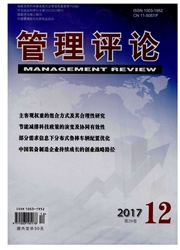

 中文摘要:
中文摘要:
本文主要是研究多属性决策中的客观赋权问题,客观赋权的一个关键问题是如何让权重更好的反映指标的数据信息,通过指标权重的大小体现不同指标的重要性大小。基尼系数作为一个反映一个国家或者地区贫富差距的重要指标,在反映不同收入人群的收入差距方面具有很好的表现,根据基尼系数的这个特点,通过计算各指标的基尼系数值来反映指标数据的信息含量和变化情况,通过对指标基尼系数值的归一化得到了指标的基尼系数权重,反映了同一指标、不同对象的差异越大,其权重越大的思想。本文同时对基尼系数赋权法、熵权法、均方差法和极值法等4种客观赋权方法在8种不同的指标数据形式下的权重进行了对比分析,结果表明:基尼系数赋权法具有适用性强、保序性好的特点。此外,基尼系数赋权法的计算也较为简单,增加了其适用性。
 英文摘要:
英文摘要:
This paper researches the objective weighting in multi-attribute decision making method. One of key issues of the objective weighting method is how to reflect the data message in the objective weights better. And the index weights can reflect the importance of different indicators. Gini coefficient is an important indicator of reflecting the gap between the rich and the poor in a country or region. Given the good performance of Gini coefficient in reflecting the income gap, this paper raises a new objective weighting method called Gi- ni Coefficient weight, which is based on Gini coefficient in economics. By calculating the Gini coefficient of each index it reflects the in- formation and changes of indicator data. The Gini Coefficient weight of index can be obtained by normalizing Gini coefficient of index. The greater the difference between different data of the same index is, the bigger the weight will be. This paper compares and analyzes the weights of Gini coefficient weighting method, the entropy weighting method, standard deviation weighting method and the range weigh- ting method under the eight different indicator data forms. The results show that the Gini coefficient weighting method is an objective weighting method with better applicability and isotonicity. In addition, Gini coefficient weighting method is relatively simple and thus more applicable.
 同期刊论文项目
同期刊论文项目
 同项目期刊论文
同项目期刊论文
 The Establishment of Green Industry Evaluation Index System Based on Dynamic Clustering-----an Empir
The Establishment of Green Industry Evaluation Index System Based on Dynamic Clustering-----an Empir A Credit Risk Evaluation Index Screening Model of Petty Loans for Small Private Business and Its App
A Credit Risk Evaluation Index Screening Model of Petty Loans for Small Private Business and Its App Study on non-structural decision fuzzy set theory based optimal combination weighting model for smal
Study on non-structural decision fuzzy set theory based optimal combination weighting model for smal A Novel Imbalanced Data Classification Approach Based on Logistic Regression and Fisher Discriminant
A Novel Imbalanced Data Classification Approach Based on Logistic Regression and Fisher Discriminant 期刊信息
期刊信息
